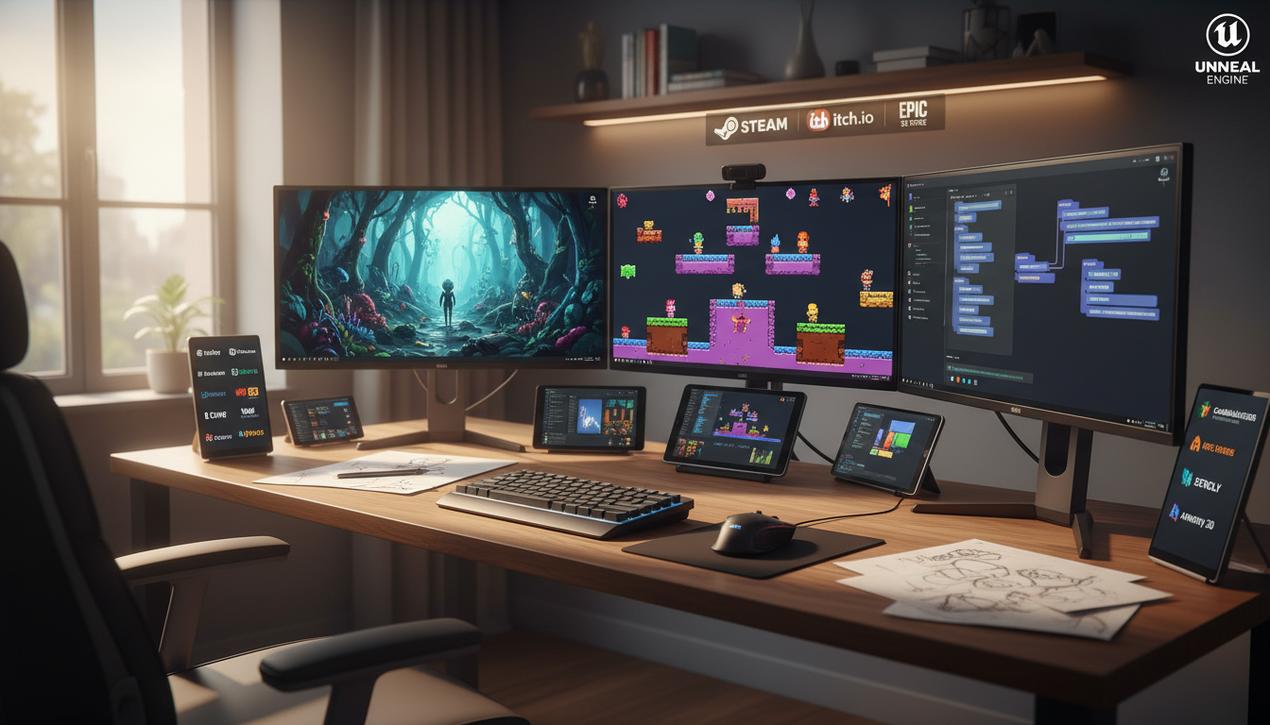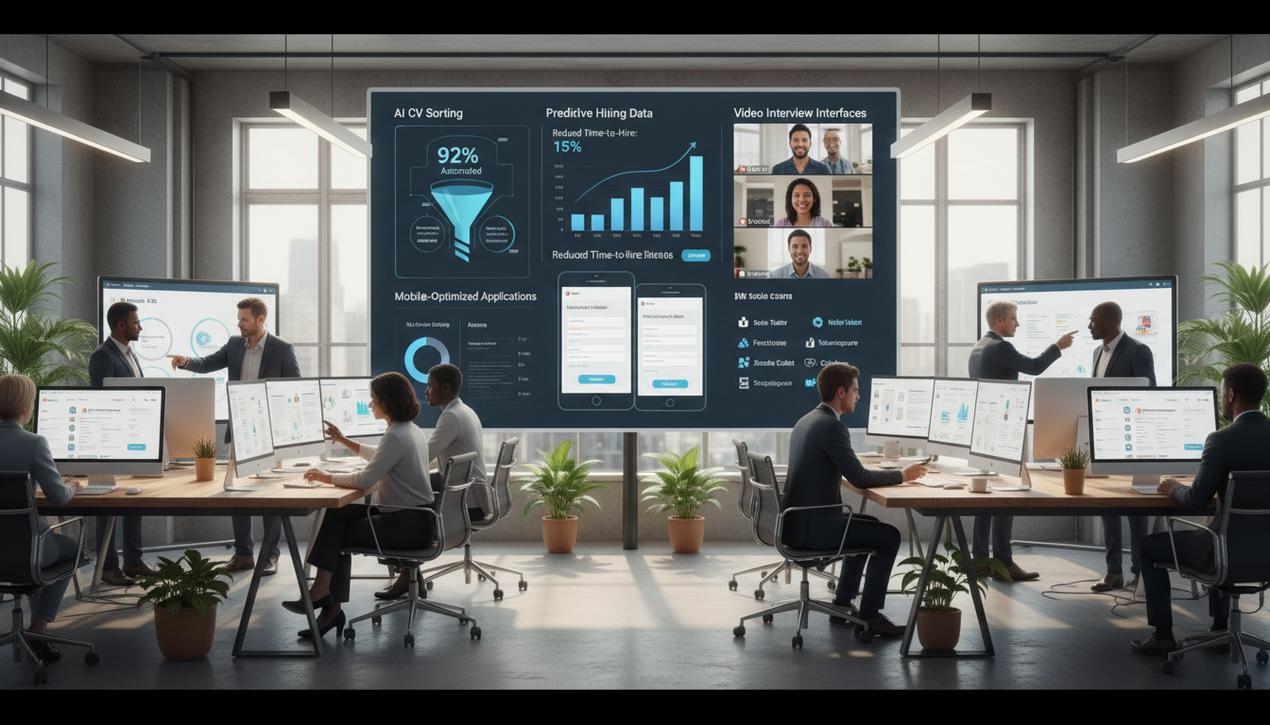How to Make a Video Game: 12 Free Tools for Beginners


The independent video game market is experiencing explosive growth, with a global valuation projected to surpass $200 billion by the end of 2025. This boom is no longer exclusive to major studios; it’s now driven by a global community of passionate creators. Thanks to the democratization of development tools, the dream of creating your own video game has never been more attainable. You no longer need to be a professional programmer to bring your ideas to life. Powerful and intuitive game engines, available for free, have opened the doors to creation for millions of artists, designers, and aspiring developers. Whether you dream of designing a 2D platformer, a complex RPG, or an immersive 3D experience, the solutions exist and are within your reach. This comprehensive guide introduces the 12 best free software tools to start making your video game today, whether you’re a complete beginner or a developer looking to master new tools.
Why Start Making Video Games in 2025?
The appeal of video game creation extends far beyond a simple hobby. It’s a field that merges creativity, logic, and technology, offering unique professional and personal opportunities. The current ecosystem is particularly welcoming to new creators.
A Rapidly Expanding Market
Far from being saturated, the video game market is in constant demand for new and original ideas. Distribution platforms like Steam, Itch.io, and the Epic Games Store make it easier than ever to publish and monetize independent games. A well-executed project, even one developed by a single person or a small team, can achieve significant commercial and critical success, as proven by titles like Stardew Valley and Hollow Knight.
Develop Highly Sought-After Skills
Creating even a simple video game is an excellent way to acquire technical and creative skills that are highly valued in the job market. You’ll gain experience in programming (or visual scripting logic), graphic design, project management, narrative writing, and sound design. These skills are transferable to many other sectors in tech and media.
The Accessibility of Modern Tools
The barrier to entry has never been lower. Professional game engines that once cost tens of thousands of dollars are now free for personal use or for small businesses. Furthermore, an astronomical amount of tutorials, documentation, and supportive online communities are available to guide you through every step of your learning journey.
The Best Free Software to Build Your Game
Each software has its own strengths and caters to different user profiles. Whether you prefer a visual, no-code approach or want to dive deep into programming, there’s a tool that’s right for you.
1. Unreal Engine 5
Regarded as one of the most powerful engines on the market, Unreal Engine 5 is the gold standard for photorealistic 3D games. Used for blockbusters like Fortnite and The Matrix Awakens, it is now accessible to everyone. Its visual scripting system, Blueprint, allows you to create complex game logic without writing a single line of code, making it surprisingly approachable for beginners. For advanced users, it utilizes the C++ language.
- Ideal for: Ambitious 3D games, cutting-edge graphics, virtual reality.
- Skills required: Programming logic (even for Blueprint), basic 3D modeling concepts.
2. Unity
Unity is the world’s most popular game engine, used in over 50% of mobile games and numerous hits on PC and consoles like Among Us or Cuphead. It is extremely versatile, handling both 2D and 3D with ease. Its learning curve is gentler than Unreal’s, and its massive community means you’ll always find help. The primary language is C#.
- Ideal for: All project types (2D, 3D, mobile, VR/AR), rapid prototyping.
- Skills required: Basic C# programming is recommended, but abundant resources exist for beginners.
3. Godot Engine
Godot is the rising star of open-source game engines. Completely free with no royalties, it is lightweight, fast, and highly flexible. It offers its own scripting language, GDScript (similar to Python), as well as C# support. Its node and scene system makes organizing projects highly intuitive. It is an increasingly popular choice for 2D games and stylized 3D projects.
- Ideal for: 2D games, indie projects, developers who value open-source.
- Skills required: Basic scripting knowledge (GDScript is easy to learn).
4. GDevelop
GDevelop is the perfect solution for those who want to create a game without touching a line of code. Based on a “cause and effect” event system, it allows you to build game logic entirely visually. It is cross-platform (Windows, macOS, Linux) and can even be used directly from a web browser. It is excellent for 2D games and exporting to HTML5.
- Ideal for: Absolute beginners, platformers, puzzle games, narrative games.
- Skills required: No programming knowledge needed.
5. Construct 3
Similar to GDevelop, Construct 3 is another excellent no-code game creation tool that runs entirely in your browser. Its interface is highly intuitive and allows for very rapid prototyping of ideas. It is particularly popular for developing 2D mobile and web games. The free version has some limitations but is perfect for learning the ropes.
- Ideal for: Rapid prototyping, 2D mobile games, game jams.
- Skills required: None; everything is based on visual logic.
6. RPG Maker
As its name suggests, RPG Maker specializes in creating 2D role-playing games in the style of Japanese classics. If you dream of creating your own Final Fantasy or Chrono Trigger, this is the tool for you. It requires no programming and comes with a vast library of graphics and audio assets to get you started.
- Ideal for: 2D role-playing games, narrative-driven adventures.
- Skills required: None, but a good dose of creativity for writing and level design is a must.
7. CryEngine
A historic competitor to Unreal Engine, CryEngine is another 3D heavyweight known for its exceptional graphics performance (as seen in the Crysis series). While very powerful, its learning curve is considered steeper than its rivals. It uses C++ and is primarily aimed at experienced teams or developers.
- Ideal for: First-person shooters (FPS), large and detailed outdoor environments.
- Skills required: Strong knowledge of C++ and 3D game development.
8. LÖVE
LÖVE (or Love2D) is an open-source 2D game framework for those who enjoy coding. It uses the LUA scripting language, which is known for its simplicity and light weight. It’s not an all-in-one editor; you write your code in your favorite text editor. It’s an excellent way to learn the fundamentals of game programming.
- Ideal for: Learning game development through code, minimalist 2D projects.
- Skills required: A willingness to learn and practice the LUA language.
9. Defold
Developed by King (the creators of Candy Crush), Defold is a free and open-source 2D game engine optimized for performance, especially on mobile and web platforms. It also uses the LUA language and includes a complete editor for assembling your scenes and game logic. It is renowned for being lightweight and fast.
- Ideal for: Mobile games, web games, projects where performance is critical.
- Skills required: Knowledge of the LUA language.
10. GameMaker Studio 2
GameMaker has been a pillar of indie game development for years, powering gems like Undertale and Hyper Light Drifter. It excels at 2D game creation and offers both a Drag and Drop system for beginners and its own scripting language (GML) for more control.
- Ideal for: 2D games of all genres, from arcade games to RPGs.
- Skills required: Can be used without code, but mastering GML is a significant advantage.
11. Stencyl
Inspired by MIT’s Scratch visual programming language, Stencyl is another excellent no-code tool. Its system of interlocking “logic blocks” makes creating game behaviors very intuitive. It is ideal for complete beginners and educational settings, while still being powerful enough to publish real games on PC, mobile, and the web.
- Ideal for: First game projects, education, puzzle and platformer games.
- Skills required: None.
12. Armory 3D
Armory is an open-source 3D game engine that integrates directly into the popular modeling software Blender. If you are already familiar with Blender, this is a very compelling option as it allows you to go from asset creation to game development without switching software. It uses a visual node-based system for scripting.
- Ideal for: 3D artists and Blender users who want to create games.
- Skills required: Proficiency in Blender, visual programming logic.
How to Choose the Right Software for Your Project
Faced with this abundance of options, making a choice can seem daunting. Ask yourself the right questions to find your direction:
Do you want to code? If the answer is no, look into GDevelop, Construct, or Stencyl. If you want to learn, Godot (GDScript) or LÖVE (LUA) are great starting points. If you already have some basics, Unity (C#) or Unreal (C++) are solid choices.
What type of game? For a 2D RPG, RPG Maker is unbeatable. For a photorealistic 3D game, Unreal Engine reigns supreme. For everything else, in both 2D and 3D, Unity and Godot are extremely versatile options.
What is your experience level? Don’t start with an overly ambitious project. If you’re a total beginner, a no-code tool will allow you to get quick, motivating results. You can always move to a more complex engine once you’ve grasped the fundamentals.
The best way to begin is to pick a tool that seems interesting, follow a few tutorials, and create a very simple game, like a clone of Pong or Pac-Man. The goal isn’t to create a masterpiece on your first try, but to learn, experiment, and, most importantly, finish a project. The journey of game creation is a marathon, not a sprint, but the tools to get you started have never been more powerful or accessible.




